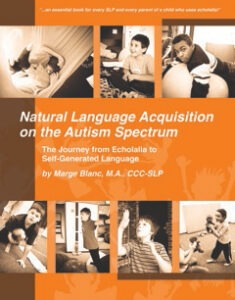Q&A
First reply to the Hutchins et al. (2024) article!
by Marge Blanc August, 2024Q: “I tried to read the Hutchins et al. article, and figure out what they actually didn’t like about NLA, but it was too hard to figure out. They obviously didn’t understand it, and couldn’t figure out that Stage 2 language consists completely of actual mitigations of Stage 1 language. That’s the ‘raw material’ they were looking for, but apparently didn’t believe was part of NLA. NLA all ‘usage-based,’ so that should’ve answered a lot of their questions.
And they wanted Marge to come up with a new theory. I wondered why, because yours worked perfectly. Hard to argue with 15 years of true qualitative research with real kids in a real clinic, but Hutchins et al. did! We hear stories every day about how well NLA supports are working all around the world, so we’re well beyond any need for ‘more research’ now, and moving on to the important next steps like older clients, and bilingual clients, and dyspraxic clients. But back to my question: when is the rebuttal going to be launched and how do I get to read it?”
A: “The truth is that our rebuttal keeps getting better and better every day, as more and more of you weigh in on your own experience with gestalt language processors or lived experience as a GLP yourself. We thought about all kinds of avenues for its launch, including the journal it came from, but we learned about that journal’s reputation and it may not be a good choice. Another avenue might be preferable.”
“We don’t have to defend ourselves to answer Hutchins et al. Fifteen years of research backs up NLA. And all the stories, anecdotes, and lived experiences we hear help to create a newer data-base. The original qualitative research from the 80’s provided the theories about gestalt language development that NLA demonstrated, and the current groundswell of additional stories further validates it. The research-based NLA supports are not ‘theory’ at all because they come directly from the research itself.”
“We think that maybe the launching of the rebuttal will happen at the UK Gestalt Language Processors Conference in September/October, and then will occupy a place on this website. But stay tuned to this space, because there might be a preview coming soon!”
https://crowdcomms-ltd.reg.crowdcomms.com/gestalt-language-processors-2024-conference/register
 “Many of you had said there’s just no reason for a rebuttal at all, that the Hutchins et al. article itself offered nothing exceptImage critique after critique after critique of NLA and asked for a different ‘theory.’ The original research-backed theory was so amply supported with fifteen years of clinical research that this makes us chuckle. Did Hutchins et al. provide the real ‘red herring’ that we can just let swim in its own little circle while the rest of us continue to changing lives for the better?”
“Many of you had said there’s just no reason for a rebuttal at all, that the Hutchins et al. article itself offered nothing exceptImage critique after critique after critique of NLA and asked for a different ‘theory.’ The original research-backed theory was so amply supported with fifteen years of clinical research that this makes us chuckle. Did Hutchins et al. provide the real ‘red herring’ that we can just let swim in its own little circle while the rest of us continue to changing lives for the better?”
“The other most common comment we hear about the rebuttal-in-the-making is something like the one we received this morning. ‘Don’t stress yourself out too much with a timeline…in the meantime, you have an army of people…continuing to provide rebuttals every day.’ “
“We hear versions of this multiple times each day as well: ‘Clinicians and parents are providing rebuttals every day when they applaud the progress children are making. NLA is here to stay, and its growth around the world is testimony to how much it resonates with everyone…’ “
“And this: ‘You wonder why no one but aba criticized NLA in the nineteen years since it came out in 2005? Remember the old days when research put everyone in a group and tried out a theory? And it worked to some extent for some of the people, and ended with an appeal for more research? That’s what EBP used to mean. Well, those days are over. The pandemic changed all that, and gave us all a level playing field where parent, autistic, and clinician voices matter! Now parents and clinicians all over the world have access to what works!’ “
“So in the meantime, if your program, clinic, or school is in anyway befuddled by the Hutchins et al. critique and can’t figure out what they’re saying in the first place and why it even matters, please email us! We offer free consultations to anyone anywhere, and would be glad to talk to your group to help them understand how to identify a red herring, and how to understand the real importance of clinical research, we will help!”
“Now, let’s all get onto the business of supporting gestalt language processing, analytic language processing, and everything in between! Our kids are counting on us to see each and every one of them as individuals, and to make good decisions that support them.”
Selected resources:
Blanc, M. (2024) “The Natural Language Acquisition Guide: Echolalia is all about gestalt language development.” https:// communicationdevelopmentcenter.com/wp-content/uploads/ 2022/09/The-Natural-Language-Acquisition- Guide_-Echolalia- is-all-about-gestalt-language-development_sm.pdf
Blanc, M. (2024) “The Natural Language Acquisition Guide: Spanish” (“Guía para la Adquisición Natural del Lenguaje”) https://communicationdevelop- mentcenter.com/wp-content/ uploads/2022/11/Guia_de_la_ANL_web.pdf
Blanc, M. (2012) Natural Language Acquisition on the Autism Spectrum: The Journey from Echolalia to Self Generated Language (https://www.northernspeech.com/ echolalia-autism/natural-language-acquisition-on-the-autism-spectrum/
Blanc, M. (2005) “Finding the Words… To Tell the ‘Whole’ Story” Autism Asperger’s Digest https:// communicationdevelopmentcenter.com/wp-content/up- loads/2022/08/ Finding-the-words-to-tell-the-whole-story.pdf
Blanc, M., (2005) “When Speech Gets Stuck. A Hierarchy of Practical Supports for Dyspraxia in Children with ASD” Autism Asperger’s Digest, 2004 https:// communicationdevelopmentcenter.com/wp-content/ uploads/2022/08/
Blanc, M., Blackwell, A., & Elias, P. (2023) “Using the Natural Language Acquisition Protocol to Support Gestalt Language Development” https://pub- s.asha.org/doi/full/10.1044/2023_PERSP-23-00098
Haydock, A., Harrison, L., Baldwin, K., & Leadbitter, K. (2024) “Embracing gestalt language development as a fundamental neurodiversity-affirming prac- tice.” Autism, 28(5).. https://doi. org/10.1177/13623613241234598
Hutchins, T., Knox, S., & Fletcher, E. C. (2024),“Natural language acquisition and gestalt language processing: A critical analysis of their application to autism and speech language therapy.” Autism & Developmental Language Impairments, Volume 9: 1–20
Peters, A. M. (1983). The units of language acquisition. Cambridge University Press.
Prizant, B. M. (1982). Gestalt language and gestalt processing in autism. Topics in Language Disorders, 3(1), 16–23.
Prizant, B. (1983a). Echolalia in autism: Assessment and intervention. Seminars in Speech and Language, 4(1), 63–77.
Prizant, B. (1983b). Language acquisition and communicative behavior in autism: Toward an understanding of the ‘whole’ of it. Journal of Speech and Hearing Disorders, 48, 296–307.
Stiegler, L (2015) “Examining the Echolalia Literature: Where Do Speech-Lan- guage Pathologists Stand?” American Journal of Speech-Language Pathology, American Speech-Language-Hearing Association, Vol. 24 • 750–762
